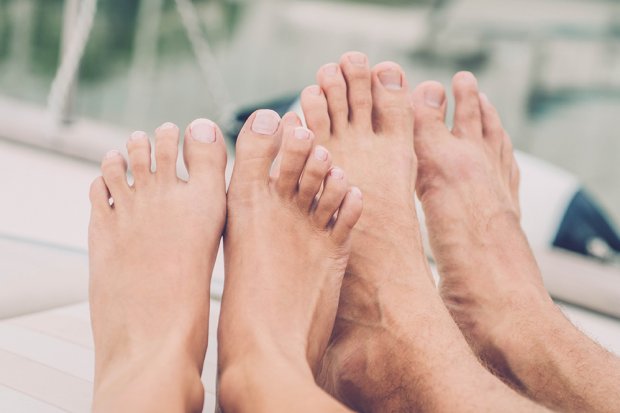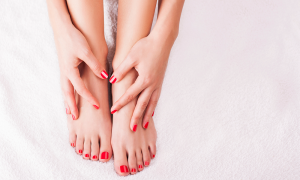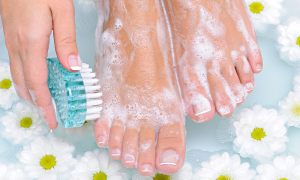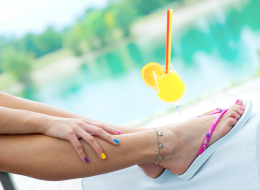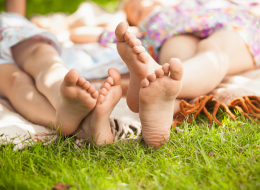Don't Sweat It Easy Ways to Stop Sweaty Feet in Their Tracks
A slip-n-slide is meant for the backyard, not everywhere you put your feet. So read on to find out how you can tackle excessively sweaty feet and keep the extra perspiration at bay.
Though it’s something every single human being does, sweating is embarrassing. And it can be particularly humiliating if the perspiration is excessive or if it’s somewhere unexpected, like your feet. Put the two together — excessive sweating of your feet — and you’ve got the recipe for a mortifying condition.
Known as plantar hyperhidrosis in the medical world, having excessively sweaty feet is thought to be an inherited problem. In addition to an overabundance of sweat, other symptoms often associated with the condition include odor, a whitish, wet appearance of the feet and foot infections like athlete’s foot and toenail fungus, which can easily invade and flourish on feet that are constantly warm, wet and sweaty.
Ways to Handle Sweaty Feet At Home
While there are medical procedures that can reduce the amount of sweat your feet produce or stop them from sweating altogether (detailed below), the methods often cause extreme side effects. Fortunately, there are many remedies you can try on your own to stop your feet from perspiring.
MORE FROM FOOTFILES:
- Wash You Feet Daily: One of the best ways to stop sweaty feet is to make sure your feet are thoroughly washed and dried every day. Use an antibacterial soap in the bath or shower and be sure to scrub every inch, especially between your toes. This helps combat odor and kills bacteria. Follow up by completely drying each foot with a clean towel. For added measure, you can try using a hair dryer to blast warm air on each foot. It is important that the feet are completely dry, as bacteria and fungus thrive in warm, wet places.
- Use an Antiperspirant or Foot Powder: Many people assume antiperspirants are only for the underarms, but you can use them on the feet, as well. Rub or spray a good quality antiperspirant over the entirety of each foot every morning after washing and drying your feet. This is a good method to use if your feet are also smelly, as many antiperspirants are deodorants, as well. Alternatively, you can try using cornstarch, foot powder, baby powder or antifungal powder on each foot. The powder wicks away moisture to help keep your feet dry throughout the day.
- Wear Breathable Socks and Shoes: One of the most common causes of sweaty feet is wearing the wrong shoes and socks, so this step is important. Though wearing cotton socks is generally recommended, people who suffer from plantar hyperhidrosis are actually advised to avoid cotton socks. The reason: While cotton socks absorb moisture, they don’t wick the moisture away from the skin and they often become sodden, which can lead to blisters. Instead of wearing cotton socks, choose synthetic blends that are specially designed to wick moisture away from the feet. Furthermore, you can try changing your socks mid-day to help keep them dry. Cleaning your feet with baby wipes in between sock changes is an additional way to keep odor at bay. In addition to choosing proper socks, it’s important to wear the right shoes. It’s best to choose breathable, washable footwear and avoid anything rubber or plastic. However, if that’s not an option, you can try inserting washable insoles that you clean and dry frequently.
- De-Sweat Your Footwear: Try to avoid wearing the same pair of shoes two days in a row. Your footwear needs a chance to thoroughly dry out before you wear them again, otherwise you’re just adding to the problem. You can also try wiping the inside of each shoe with an antibacterial spray or surgical spirit each day to keep odor at a minimum. Additionally, you can try vacuuming the insides of your shoes every couple of weeks to rid them of dead skin cells and dried sweat.
- Try Going Barefoot: One of the best ways to allow your feet to breath is by staying barefoot whenever possible. Not only is the practice gaining in popularity and said to improve health, it is a simple way to expose your feet to the air and allow them to dry out.
- Try Antiperspirant Foot Soaks: It may sound counterintuitive to soak sweaty feet, as they have enough moisture already. But soaking your feet in the right solutions can actually combat perspiration. Try adding 1/2 cup of organic, unfiltered apple cider vinegar to a quart of water and soaking your feet for 15 minutes a few times per week. You can also try adding in a few drops of tea tree oil, which has natural antibacterial properties.
READ MORE: 6 Foot Soaks For Smelly, Sweaty Feet
When to See a Podiatrist and What Doctors Can Do
Normally, having sweaty feet isn’t a serious health issue and can be dealt with by improving hygiene and choosing proper socks and shoes. Keep in mind that each foot has an average of 250,000 sweat glands that produce about a half a pint of sweat each day. However, if excessive sweating is getting in the way of your normal, daily activities, it might be a good idea to visit a doctor or a podiatrist (a doctor trained specifically in matters of the feet).
Some common measures a doctor may suggest to reduce foot sweating include:
YOU MAY ALSO LIKE:
- Iontophoresis: Iontophoresis is a procedure in which you place your feet in a bath of water in which very small electrical currents are passing through. The treatment is time consuming, slightly uncomfortable and difficult to obtain, which can turn some people off from trying the method.
- Botox Injections: Injections of botulinum toxin (botox) can be administered to help temporarily reduce foot sweating. Botox works by interfering with the signals your nerves send to your sweat glands. The procedure typically involves about 30 small injections and lasts a couple of months.
- Anticholinergic Drugs: Anticholinergic drugs help excessive sweating by blocking the nerves responsible for sending signals to your sweat glands. However, they come with quite serious side effects including blurred vision, constipation, drying of the mouth and sedation.
- Sympathectomy Operation: A very extreme method, a sympathectomy operation permanently destroys the nerves responsible for foot sweat. It is the least recommended option, as it is irreversible and has been known to lead to other problems including excessive sweating in other areas of the body, collapsed lungs and Horner’s syndrome, which is a nerve injury that leads to drooping eyelids and trouble with the pupils of the eye.
Notice concerning medical entries:
Articles having medical content shall serve exclusively for the purpose of general information. Such articles are not suitable for any (self-) diagnosis and treatment of individual illnesses and medical indications. In particular, they cannot substitute for the examination, advice, or treatment by a licensed physician or pharmacist. No replies to any individual questions shall be effected through the articles.


